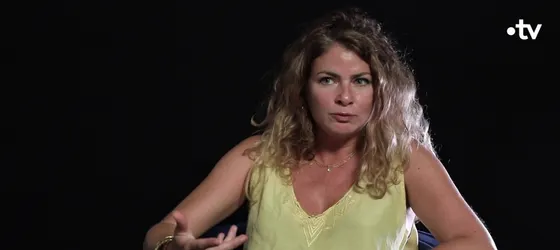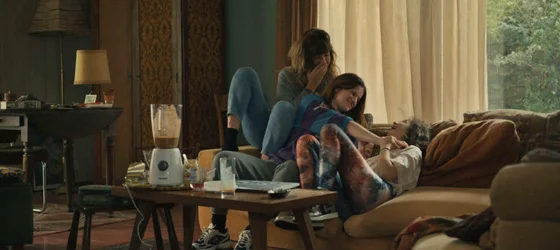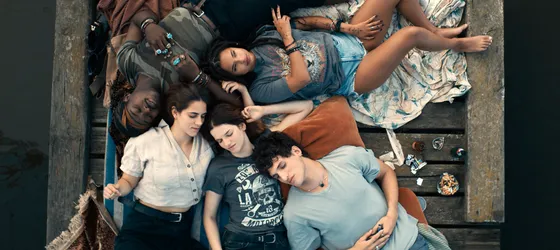
“About Sasha” is the first French series about intersexuality, the first season of which recently became available online. Through the nuanced and complex story of its eponymous intersex title character, “About Sasha” is a series that challenges traditional ideas about sex and gender and shows that there is more than one way to identify. The series has been praised for its accurate and sensitive portrayal of an often misunderstood and misrepresented community. With its strong and proud message, is sure to break all gender taboos and change the way we think about sex and gender.

Photo @France Télévisions
Yaël Langmann, the creator, writer and co-director of “About Sasha,” was inspired to create the story ten years ago after meeting an intersex person.
“I’ve wanted to tell this story for a long time,” she said. “At the age of my characters, I had a whole bunch of friends. Among them was a rather comfortable person who, during a medical examination, found out why their body was covered with scars. They discovered they were born intersex and that it had always been hidden from them. This was very violent for them: they felt monstrous, according to their own words at the time, because of this medical label, which modified their relationship with others and especially with themselves. Witnessing this collapse of identity was revolting and shocking for me.”
However, when she first announced the project, she faced a lot of backlash from people who denied that intersexuality existed or claimed that it was just like being transgender.
Despite this initial opposition, Langmann persevered with her project, and “About Sasha” has now been acclaimed as an important portrayal of the intersex experience.
It recently won the award for best French TV series at the 2022 Séries Mania, Europe’s largest TV series festival, which annually presents the most exciting upcoming international TV shows.
Intersex is a term used to describe a person whose gender characteristics do not fit neatly into the category of male or female.
These characteristics can be external, such as ambiguous genitalia, or internal, such as having a mix of male and female chromosomes.
One of the most controversial aspects of intersex care is the practice of performing numerous forced operations on intersex babies and children. These surgeries are often unnecessary and can cause lifelong physical and emotional damage.
It is difficult to estimate the number of people who are born intersex, as many cases remain unreported. However, it is estimated that 2% of people are born with some form of intersex.
Most of the time, “parents and children evolve at the same time in learning what intersex is,” Yaël Langmann explains.
She adds, “At birth, parents are told that their children are sick and that they need to be fixed. In reality, a person born with an intersex body does not need to be fixed at all. If children are operated on at birth, they have to be monitored for the rest of their lives - it’s terrifying. This medicalization is opposed by the UN, which reminds us that ‘these children are perfect just as they are!’”
“About Sasha” (Chair Tendre) is not a medical and pompous TV series. It is a story of a teenager like any other, with life in a new school and outside, friends, first love, parties, a sister who gets in the way, and a family that is a bit rock n’roll.
“The idea was to tell the story of a possible journey and above all not to fetishize this character by telling her medical journey,” explains Langmann.
“We wanted to stick to Sasha’s emotions and human experience,” she adds. “At 17, sometimes you want to throw yourself out with the bathwater. The world seems violent, and at the same time, you’re bloated with desire and feel invincible. We can be extremely troubled by microscopic things and be strong in the face of terrible dramas. The idea was, through Sasha and all her gang, to find this feeling of adolescence. The idea was to show that we are all tender flesh.”
The project took ten years to complete, but now it is here for our greatest enjoyment.

When the story begins, Sasha Dalca (Angèle Metzger), a 17-year-old intersex teenager, her parents Cécile Dalca (Daphné Bürki) and Jérémie Dalca (Grégoire Colin), and her younger free-spirited sister Pauline Dalca (Saul Benchetrit) have just moved to a new region, the Landes, in southwestern France. Until a few months ago, Sacha was still living as an ordinary boy and was just discovering her identity and her sexuality as any other teenager. However, the discovery of her intersex condition - hidden by her parents “to protect her,” and by the doctors, who kept trying to “fix” it - turned her life upside down.
Feeling uncomfortable in her body, Sasha has to deal with this feeling of strangeness that obsesses her. She's neither a boy, nor a girl, but she’s a fighter. Instead of succumbing to the pressure of society, she embarks on a quest to learn more about herself and her identity. She navigates through the typical struggles of adolescence, through a backdrop of desires, sexuality, and first times.
Along the way, Sasha makes mistakes and faces a lot of obstacles. But she also meets people who help her see the world in a different light. Slowly but surely, Sasha develops a new understanding of who she is and what she wants in life.

One of the other interesting aspects of the show is also how Sasha’s parents, Céline and Jérémie, react to their child’s identity crisis.
On the one hand, they wanted to protect her by having her undergo gender designation surgery as a child, and now, we feel all the guilt that is eating away at them.
On the other hand, they are completely overwhelmed by the situation and have no idea how to handle it. They want their child to be happy and live her life authentically but are not sure how to address it. Many parents of intersex children find this balancing act challenging. “About Sasha” does a good job of showing how complex and difficult it can be for everyone involved.

When it came to choosing the actor to play Sasha, showrunner Yael Langmann had a difficult decision to make. Because the character of Sasha is intersex, Langmann knew it was imperative to find an actor who could authentically portray the experience of living in an intersex body. After a long search, she finally chose Angèle Metzger for the role even though she is not intersex.
In an interview, Langmann explained her decision saying, “As young intersex people are already in turmoil, they prefer not to come out so abruptly in a drama. If other cisgender actors did not convince us in the casting, Angèle imposed herself by her humility and her remarkable intelligence.”
Angèle Metzger delivers a portrayal that is both powerful and nuanced. She captures the strength and vulnerability of the character, making her immensely relatable and sympathetic.

The rest of the cast includes:
Note that Yaël Langmann was accompanied throughout the writing process and on the set by Loé Petit and Lysandre Nury, the co-founders of the Collectif Intersexe Activiste, the first association in France for intersex people.
“Before we even started to write a single line, we called on Loé Petit, who co-founded the association and who was our consultant for the entire project. They allowed us to validate the psychology of the character, but especially the credibility and accuracy of our story. They showed great patience and generosity to allow us to tell this individual story in which the intersex community could recognize itself.”
And Nury has officially become the first intersex actor to appear in a French television series. They play Loé, Sasha’s intersex mentor.
“It’s super important that the Collective exists in the show because usually intersex people are portrayed alone, without any connection to their community,” says the actor.
They add: “It’s dramatic because the medical ideology to hide intersexuality makes it a real taboo. It is very difficult for an intersex person to get rid of this feeling of shame that is instilled in them. Often, doctors put a lot of emphasis on the rarity of our variations, and the discovery of intersexuality is accompanied by a terrible feeling of loneliness.”
Go ahead and check out the trailer for “About Sasha” below. I think you’ll be hooked from episode 1.
The show is comprised of 10 episodes. They are only available in French at the moment but can be watched for free on the France.tv Slash and Canal+ platforms. Here’s the link to France.tv Slash: france.tv/slash/chair-tendre and the one to Canal+: canalplus.com/bl/series/chair-tendre.
Also, the first three episodes are available on YouTube so with auto-generated subtitles at: youtube.com/watch?v=9uowkSzAdXY&list=PLa-HJ7MYdYOgOIndVeuCUnF8LqS1Sdhqu.
Note that Disney+ recently signed a deal with France TV Distribution to stream “About Sasha” across Europe (excluding France), the UK, the Middle East, and Africa on its platform in 2023.
“For me, Disney has always represented a magical-sounding entity whose core business has always been to tell stories. And what stories! We couldn't be prouder to have such a prestigious partner with such committed choices,” France TV Distribution's SVP of international sales Julia Schulte said. “About Sasha is a series full of energy and light, emotions and honesty about the difficult subject of the search of identity. The series concerns us all and we are more than happy about the international release on Disney+.”
“About Sasha” is a groundbreaking exploration of the complex issues surrounding gender and identity. It offers an honest look at what it means to be intersex and the challenges of finding acceptance from those around you.
The show does an excellent job of depicting the struggles the main character faces daily. It shows how diverse everyone’s journey to self-knowledge and acceptance can be.
Sasha’s story is unique, but it will probably resonate with you as well, just as it did with me.
Many of us have felt, at some point in our lives, that we don’t fit into the box that society has created for us. Whether we are trying to conform to someone else’s idea of who we should be or struggling to find our own identity, it can be easy to feel lost and alone.
However, stories like Sasha’s remind us that we are all part of the same human family. We may have different interests and passions, but at the end of the day, we all want to be loved and accepted for who we are.
This story shows us that each of us is unique in our own personality while reminding us that we are all part of the same species.
“About Sasha” is an important series that sheds light on a topic that is often ignored or misunderstood by society and brings much-needed visibility to the intersex community. Currently, people know very few things about intersexuality, so the show can serve as an informative starting point for an open dialogue on the subject.
Yaël Langmann hopes that her series will contribute to changing mentalities while showing that there is no need to be ashamed of being intersex. Her goal is to help create a more inclusive society where everyone can feel comfortable in their own skin. “About Sasha” is an extremely key step in achieving this goal, and I hope that it will help to open people’s eyes to the reality of intersexuality.
"About Sasha" is a miniseries, and as such, there are no plans for a second season.
Comments